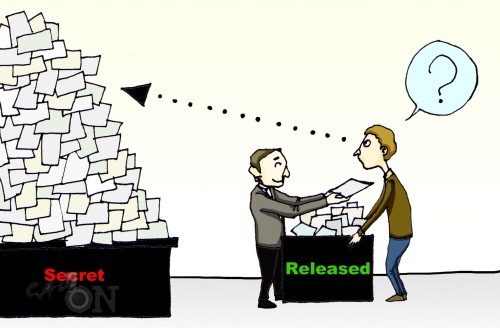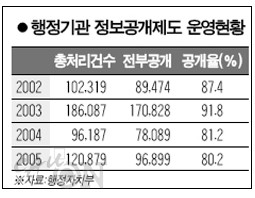
"The debate of quantity vs. quality concerns over the Public Information Act in an administration that proclaims to be a participatory government is developing our nation."
-< The Letter from the President for Public Service Personnel, July 2007 >
"The Public Information Act of Korea was the fastest in the world."
-< Self-evaluation of the Secretary’s Office to the President >
As you know, President Roh Moo-Hyun and his participant government have said this self-laudable appraisal about the Public Information Act. The Public Information Act is used to ensure the right of obtaining information transparency about operations in the nations administration, as regulated by the public demands of the nation, and open to the public commitment to public institutions.(31,December,1996/the law-no.5242)
However, it is quiet different in practice.
->Not going in company with the occasion- the list of information
According to an order from the Ministry of Government Administration and Home Affairs", department should update the list of information." However, only 85 departments submitted it in the first place. The number of policy departments is 186 in the 41 central administration organizations. The update rate of departments was only 45.70%. The Public Procurement Service presented the lists of information in 2005. The National Tax Service did not update, only one list was updated as of 10, September 2006.
->Open to the public in surface area
Of 27 departments, which were attached to the central administration organization produced 4736 information lists. It was surprised that 79.98% of these were open to the public and 20.01% (account=948) were considered classified information or part classified information. However, important information was mostly not opened to the public. For example, the Ministry of Science & Technology classified as an official document, demanded cooperation on the actual way a government lawsuit budget should be documented to the public, while with Department of the Government Judicial Affairs Public Corporation (the law form-work on national lawsuits)’ asked to have documents classified and not made available to the general public. Therefore, the Ministry blockaded the approach on classifying information, which has generated interest among citizens. Since the ministry opened these public records, there have been ‘articles purchase’, instead of ‘notification of appointments of public administration policy change’ classifications. There were many criticisms. It is considered by all to be a big effort to high open rated superficiality.
It is a problem that information is not circulating. Where did these problems originate?

->The secret criterion is vague.
According to the 41st Central Administration’s homepage, the criterion for classification levels is vague. The various categories are: "when related to private", "when disturbed impartiality of administration working", "for attendance's mentality burden", "when there was possible to trouble ordinary life", "though work-process was finished, when there was obstacle to future work of administration through opened." and others. The criterion has not kept its consistency with each ministry and office. The law related to this open information of the public institution (wrote in a clause No.9-1) states that there are eight conditions used to define different classification levels. A citizen who resides in Namyangju-si, Kyonggi-Do can demand to open information about the bus-line in the town bus company. However, according to "secret in management and business of corporations and individual" category written in the Public Information Act (clause no.9), the information is classified. The citizen demanded a judgment in administration, and it was finally opened after a tough process. As in the case we saw, not only the Public Information Act, but about 30 laws effects the status of classified or non-classified information, such as (‘the ethics of public official act’(clause o.14-3), ‘the act about office work in the civil application’(clause no.13), ‘administration inspector regulation’(clause no.28)and so on.

->Improved only speed
From August 1st to 31st, 2006, the examination result of the Segye-Ilbo said that the "settlement period of public information in the central administration organization was faster than 1998 (10.3% for 'take 8~15 days for a decision period) with recording 93% for 'within 10 days'. However, there was no actual primary achievement. However, when we checked the 'opened information rate by public demand’, it become clear. The 'Opened information rate by public demand’ has recorded a decline after recording 95% of its evaluations in 2003. In addition, it showed a 70% evaluation completion rate in 2005. More seriously, 'no existence of information and the others' recorded a 34% rate in 1988 and 31% in 2006. Even though the reason for the changes in government policy was to create more transparency, it did not show improvement.
->Poor operation of the Public Information Deliberation Council
A report on the assessment results in 2003 was appointed a "utilization level of 11 organizations under The Public Information Deliberate Council. These were rated good and the other 9 organizations were rated not good." A report in 2004 also said, "most organizations were not utilized by The Public Information Deliberate Council legally, and actual results were ‘dull’. In addition, although a number of the Public Information Deliberation Council increased from 35 to 40 in 2005, the number of deliberations were decreased from 510 to 121.
Moreover, it was more a surprise that the government already knew about this problem 9 years ago.
->They settle down as a spectator!
The Ministry of Government Administration and Home Affairs said "there is no existing list of the position on information," and "being required guidance on position of information" through a report in 1998. The Government certainly appointed a problem of operation in the public information act. The Government knew about this problem for they said, "Being required is an effort to reduce expenses, which was used efficiently through the use of demand information which was kept in the public office" in 2003. Government’s attitude is vague on criterions was similar to a valuation report in 2003; it appointed "a certain criterion that did not relate to work of the public office and copying other criterions is only a matter of convenience." Certainly, it prearranged a shortage of concreteness. Although they had evaluations, there are indications they were rotated from department to department with "criterions not useful to application of work in 2004, (Government valuation report)"
Kyoung Gun, a professor at Seoul National University and a member of the Task Force (TF) on the public information reinforcement criticized these actions by saying that “there is a tendency that public service personnel tended to regard the public information act not as right of the citizenry but as popular complaints.” In addition, he said that there needs to be “change recognition of public information by blocking paralysis from management”. Professor Kyoung said the disposing situation of the public service personnel, has crushed the spirit of the acts… “Although objects of classified information were elucidated, it is not compulsory. It is only discretion that they had the ability to give out secret information even if part of the information is not open to the public, the rest of opened information policies is an obligation.” Namely, there is not the whole secret and partial open is principle.
The person related to Ministry of Government Administration and Home Affairs said “secret was exceptional situation, in principle, the greatest opened to public is a position of government” Also he said, “in fact, as public service personnel, it is a burden to open information for responsibility problems.”
Some of the public service personnel think when most work information is opened to the public, it would make many confused. So, they do not welcome open information. However, this thinking is a misunderstanding. When they open information to the public, transparency and responsibility could be ensured.
In Europe, their concern is not the public information but agony to produce information with the citizenry. It is ground requiring solutions.
->Producing the instrument let us to access information
It is hard to call Korea’s public information policy open with a '10% classified information rate’. However, because information, which we cannot easily obtain, is opened, and the process of decisions in policymaking is also not opened, the citizenry tends to feel that the government is inclined to have secrets. Therefore, for access of specially information, it is necessary to force the administration to make assembly records with maintaining and ensuring rights the ability to have access.
->Separation between maker and decision
The problem is the information maker, who decides yes or no about classifying information. It is the present system. Therefore, law requires separation between production and decision. For example, in Finland, Sweden, and Canada, development of the Public Information Act was considerably high. These countries regulated laws one by one to keep policies fair and open. However, in Korea, the Public Information Deliberate Council, which is nominated by Heads of the Public Officials, corresponds to organizations that had the right to decide on laws. As this background, there was a criticism that it raised about self regulation.
Although the science level of the Soviet Union was considerably high, their level of economy became poor due to a lockout. It has already been proved that the more open a government is with its citizens, the more they contributed to social and economical developed.

